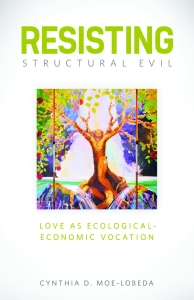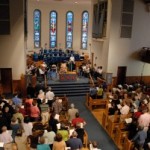 It seems fitting to Good Friday for me to share a bit about a new book by my friend and colleague Dr. Cynthia Moe-Lobeda: Resisting Structural Evil: Love as Ecological-Economic Vocation. Good Friday, to me, puts Christians squarely at the intersection of the real power of death and destruction in the world, and the hope for something more, for life abundant, for life in spite of the cross and Jesus’ execution at the hands of state power. It is this intersection at which Cynthia writes about systemic inequalities as well as a call to love and act to interrupt those systems.
It seems fitting to Good Friday for me to share a bit about a new book by my friend and colleague Dr. Cynthia Moe-Lobeda: Resisting Structural Evil: Love as Ecological-Economic Vocation. Good Friday, to me, puts Christians squarely at the intersection of the real power of death and destruction in the world, and the hope for something more, for life abundant, for life in spite of the cross and Jesus’ execution at the hands of state power. It is this intersection at which Cynthia writes about systemic inequalities as well as a call to love and act to interrupt those systems.
Her opening words set the tone for a book that is both wide-ranging and keenly focused on justice:
“Awareness that all was not well between people like me and many of the world’s impoverished people dawned in me through a film. … But merely knowing, I learned, was not enough to enable radical social change toward justice. The chains that bind us into systemic exploitation of others and of the Earth are intricate and cleverly hidden. These chains, however, can be broken and transformed. The world is full of people doing just that. In these pages, we examine these chains as “structural evil,” forces that bind our power to live in ways that “love neighbor as self” and to protect Earth’s wellbeing. These forces include intricate webs of interrelated power arrangements, ideologies, values, practices, policies, and ways of perceiving reality that span generations and have unintended snowballing consequences.”
From the publisher’s website:
The increasingly pressing situation of Planet Earth poses urgent ethical questions for Christians. But, as Cynthia Moe-Lobeda argues, the future of the earth is not simply a matter of protecting species and habitats but of rethinking the very meaning of Christian ethics. The earth crisis cannot be understood apart from the larger human crisis—economic equity, social values, and human purpose are bound up with the planet’s survival. In a sense, she says, the whole earth is a moral community.
Reorienting Christian ethics from its usual anthropocentrism to an ecocentrism entails a new framework that Moe-Lobeda lays out in her first chapters, culminating in a creative rethinking of how it is that we understand morally. With this “moral epistemology” in place, she unfolds her notion of “moral vision” and applies it to the present situation in a full-fledged earth-honoring, justice-seeking Christian ethical stance.
I’ve heard Cynthia speak several times over the past fifteen years on these and related issues, and commend her work to you now.
Author note: Honorable Mention is a recurring feature on this blog … a quick mention or shout-out to something worth noting.












